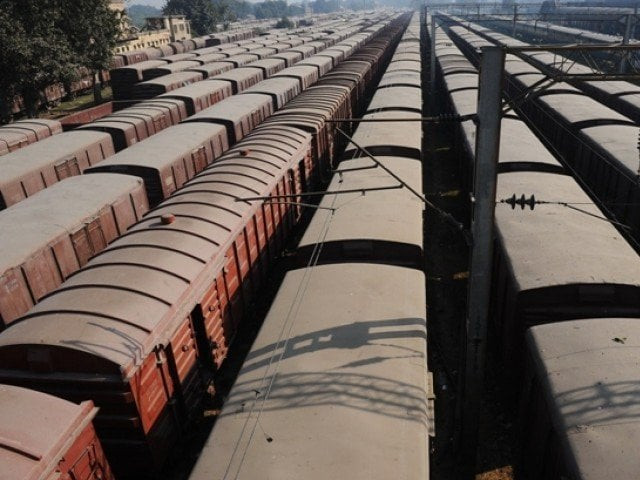Reinventing Pakistan’s rail infrastructure
Assessing how Pakistan is steaming ahead with new transnational railroad projects

Imagine a train trip in 2025 on a transnational railroad that stretches from Karachi to Kazan in Russia – thanks to a transport corridor that passes through at least a dozen economic centres in Europe and Asia. This hypothetical train trip to Europe is now no longer just a vision as pieces of this transnational railroad jigsaw puzzle are finally getting together while Economic Cooperation Organization (ECO) member countries negotiate an Istanbul-Tehran-Islamabad (ITI) freight train service. This ITI transit rail link may then lead to a potential tri-lateral economic bloc after ensuring uniform tariffs, removal of quotas and liberalisation of trade in general.
At the same time, Pakistan is pushing a deal to pursue transnational railway line project with Uzbekistan and Afghanistan. Uzbekistan and Afghanistan are also part of the ECO; so these two separate deals could apparently lead to a more powerful, balanced and a liberal trade bloc that is not aligned to any global trade power such as the US, Russia, China, Japan or India.
Historically Uzbekistan has not been a part of Russian-led Eurasian union and attends Eurasian Economic Union only as an observer. However if this new deal goes through then Uzbekistan can surely pitch its access to new markets via Pakistan to fast track its case for Eurasian membership. Recently, Uzbekistan also joined the China-Kazakhstan-Turkmenistan-Iran railway corridor after agreeing on a complex set of custom rules which will certainly bring in great dividends as it did for Kazakhstan after becoming a part of China’s “new silk railroad.”
However, all these infrastructure developments have a geopolitical context and they are only happening after the US government conceded geopolitical space in Asia. Now, under the Biden administration, multilateral projects with Iran are expected to get a go-ahead too. In a changing geopolitical environment, ECO’s ITI initiative is a pilot project which, if successful, could lead to integration with the rail project between Uzbekistan, Pakistan and Afghanistan in the second phase. It will ensure balanced trade accounts as ECO countries deal in local currencies and a potential ECO free-trade agreement will further cut transactions costs and dead-weight in multilateral transactions. Moreover, this network will complement and not compete with China’s strategic belt-road initiative by providing alternative trade routes to Beijing through ECO member countries.
However, the key strategic bits of such a master plan should be based on mitigation of trade bottlenecks – both hardware (infrastructure) and software (policy blueprints). For example, while Iran and Turkey possess railway infrastructure to carry heavy freight trains, Pakistan’s Karachi-Peshawar Railway Line is in shambles. As part of the China-Pakistan Economic Corridor (CPEC), the technical and financial feasibility of the project to upgrade Karachi-Peshawar Railway, also known as Main Line 1 or ML-1, was delayed several times on different pretexts.
Initially the scope of ML-1 was reduced by 50% and later even with reduced scope, it was delayed as the cost of phase-1 quoted by Chinese consultants was $630 million higher than the one quoted by NESPAK. Besides this, it seems that Pakistan Railways has been postponing the project for two more reasons: Firstly, though ML-1 will increase the line capacity five folds yet this increased capacity will remain underutilised for the next 20 years. Secondly, the Ministry of Finance and the Planning Commission want to secure the Chinese loan for ML-1 against Pakistan Railways’ assets but Railways wants to shift the loan-servicing responsibility to the centre. Recently, the Chinese have also sought an additional guarantee mechanism for the ML-1 loan keeping in view the dire financial situation of Pakistan Railways and the EPC (engineering, procurement and construction) mode of the contract.
Moreover, besides weakness in our rail infrastructure to implement the ITI vision, we also face shortcomings in ‘software’ - such as weak institutions, courts and regulatory bodies. Our trade policies remain very strict in general and labour mobility is a burning issue till date. We can’t expect to see fruits of regional integration unless Pakistan signs trade agreements with other neighbouring countries including Iran and Afghanistan.
However, mere free-trade agreements are not enough. We saw that the positive spill over from CPEC and Chinese FTA haven’t happened due to non-transparent and closed procurement processes in the award of infrastructure projects to state-owned enterprises. FTA was expected to make domestic industry more competitive - incentivising innovation and boosting productivity but it didn’t. The success of such trade projects also rely on participation of private sector during every phase - though a little protectionism of local industry for the initial years may not be a totally bad idea either.
In a nut shell, investments in railway infrastructure sound like a convenient policy lever to fabricate aggregate demand and stimulate growth amid recession. But these investments should also come from the private sector as only multilateral participation can sustain such ambitious projects in the long run - especially when fracturing politics is putting the future of ML-1 in doubt. The government should in particular avoid engineering state-owned special-purpose vehicles for awarding O&M contracts under the guise of PPP contracts, and a level-playing field consistent with the principles of competitive neutrality should be maintained.
Should it happen, Pakistan Railways can access many private sector financing instruments—loans, bonds, equity, leasing—as well as PPP and BOT (Build operate transfer) modes as a project delivery mechanism.
The writer is a Cambridge graduate and is working as a strategy consultant
Published in The Express Tribune, January 4th, 2021.
Like Business on Facebook, follow @TribuneBiz on Twitter to stay informed and join in the conversation.



















COMMENTS
Comments are moderated and generally will be posted if they are on-topic and not abusive.
For more information, please see our Comments FAQ